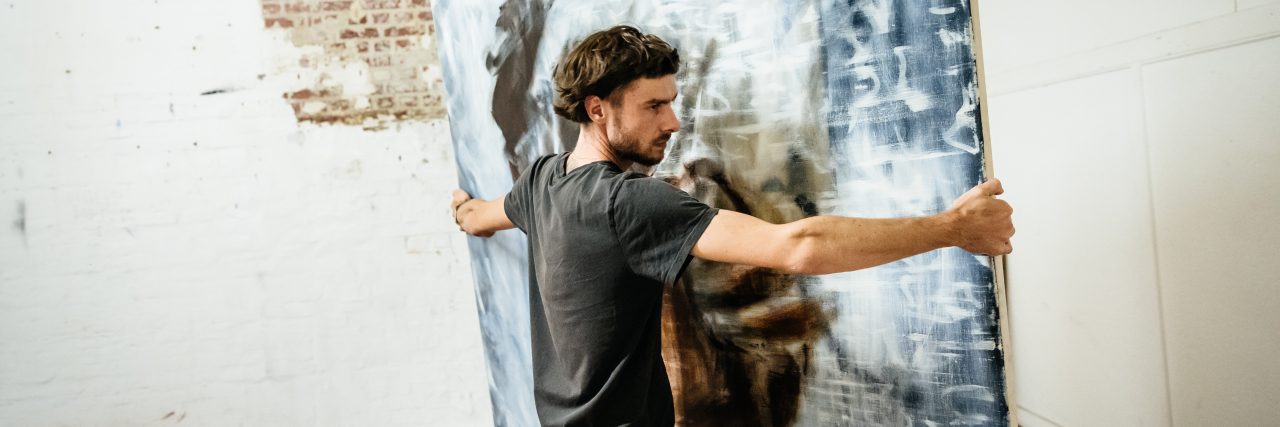How My Schizophrenia Helps Me See Others With Health Conditions as 'Portraits' in My Mind
A while back, a Picasso exhibit came to my city’s art museum. I was excited to view the exhibit because I have always admired Picasso and his influence on other visual artists. One painting by Picasso, called “Celestina,” was a woman with an eye that was semi-closed — even dead — Some might call her “ugly.” Picasso painted “Celestina” during his Blue Period, using drab shades of blue and an overall theme of despondency. “Celestina” has so much detail that one might think it a photograph upon first examination. Personally, I was drawn to her eye. While the rest of this woman felt commonplace, her eye called out for my attention.
I wondered how Picasso had encountered Celestina. Was she familiar to the people around her community? How did they treat her because of her eye? Did Picasso ask her to come to his studio so he could paint her? Did he just file her image away in his mind and paint her later? What was Picasso’s motivation for painting an older woman who had a clear facial difference? For his own reasons — which we will never know — Picasso wanted to remember Celestina because she had some impact on his life.
I have lived in my average-sized city for many years, but I will soon be moving to a different state. Just like Picasso, there are people that I see on a regular basis who have formed portraits in my mind that I will never forget, even when I arrive in my new state.
There is an employee at the grocery store whom I enjoy seeing when I am shopping. When I see him there working, I assume he is doing OK — after all, he made it to work. On the few occasions when he speaks, I have to listen closely because he is very soft-spoken. Even when this man is facing me, he does not make eye contact. His left arm hangs low, and it looks like it is a heavy weight he has to drag along with him. His arm was potentially injured in an accident, or maybe he was born that way. Sometimes he works in the self-checkout section. On other occasions, he works as a cashier. This tells me that he is a dedicated and trusted employee who has been given responsibility at his job.
Sometimes when I am in public places, my schizophrenia is triggered, and I think people are talking about me behind my back — laughing or staring at me and wondering what I am going to do next. When I pass this man in the store, though, I am never paranoid. Long after I move, I will remember his face and mannerisms. He is a portrait in my mind of someone who, without knowing it, has made a small impact on my life.
I have to go to the veteran’s hospital once a month for medication and to speak with my psychiatrist. When I am in the mental health waiting room, there are faces that are comforting to see. Because of the pandemic, there have been fewer people in the waiting room, but there is a man who talks loudly to himself and who does not appear to be able to sit still for long. I suspect that like me, he is hearing voices, and he may think he has to respond. Whenever he sees me, he always says “hi,” and I smile back and ask how he is doing. He always answers that he’s “fine.” Then he goes back to speaking to his invisible stranger. I do not know his name, but I remember his kind smile and his friendliness.
There is also a young man and his dad who I often wonder about. I know how important it is to have support from family because of my mental health diagnosis, and I am so glad this young man has his dad with him to help him ask questions and gain confidence. The duo is usually quiet in the waiting room, but the dad lights up when he sees me, and I always ask how they are doing. I can relate to the young man because there was a time when either my mom or my dad had to go with me to my mental health appointments.
Both these men at the veteran’s hospital are veterans, and they seem to be dedicated to staying on top of their diagnoses because they are waiting for appointments to get help just like I am. They have given me encouragement as I see how determined they seem to improve their health. They seem to know how important support is and also seem willing to give it to their loved one. Their portraits in my mind will bring smiles to my life forever. Seeing these men in my reality has given me comfort. Everyone has some kind of struggle, but these men seem to be doing something about theirs. They look to be soldiering on and not surrendering. I hope they receive the same kind of joy in life that they have given me.
These are just some of the people I have added to my “portrait gallery.” They are priceless in their ability to spread enjoyment to anyone who is willing to search for their strengths. I am thankful to have them in my collection of portraits in my mind.
Getty image by Tom Werner.

